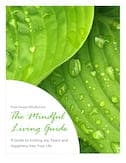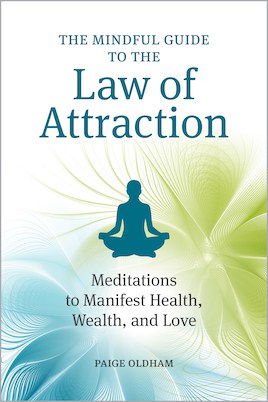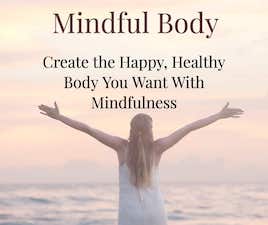Is it possible to be happy all the time?
And a bigger question: Would you want to be happy all the time? How would that feel? Would you feel like you don’t deserve it? Or do you think it’s impossible?
Society says that if you achieve your goals, if you’re “successful” (whatever that means), you can be happy. At least that’s the story. But it’s a lie. That kind of happiness is fleeting. It’s based on externals – things you can’t control.
True happiness – not that fleeting, giddy feeling – is more like an inner contentment that comes from within you. It’s a choice that’s completely within your control.
I’ve dealt with a mild to moderate depression for most of my life. I was waiting for everything I dreamed of to come together perfectly before I could be happy. I had to achieve all the goals I laid out for myself. I had to be the person that I thought everyone wanted – expected – me to be. I had to be enough. That day never came no matter how hard I tried. Whatever I did or achieved wasn’t enough. The more elusive it was, the more depressed I became.
One day I read about gratitude lists and journals and thought I would give the idea a shot. At first, it was tough to think of ten things for which I was grateful. But I stuck with the practice every day. Like any practice, when you do it daily, you don’t realize the impact that all those baby steps are making.
Before I knew it, my gratitude lists went for pages each day. It was hard to stop. In that process, I began to notice that I wasn’t feeling as depressed. I was beginning to see the silver lining in situations. I could see what was right with people and situations instead of what was wrong. I began to feel happy more often.
After going through a happiness course, I learned that a daily gratitude practice is one of the core tenets of lasting happiness. The other tenets are balance, creating a positive outlook and letting go of pride or ego.
Balance
Balance begins with looking at all aspects of your life to see where you’re not in balance. Maybe you work too much and play or exercise too little. Look at your relationships, career, finances, spirituality, hobbies, health, creativity, leisure. What areas need more or less of your attention?
Balance also requires you to take time each week to reflect on how your life is going, how you feel. This is the step where you listen to your heart, that part of you that is usually swept into the background so you can focus on “more important” things. There couldn’t be anything more important to your happiness than what your heart, your True Self, has to say.
Create a Positive Outlook
Creating a positive outlook is about making time each day to laugh and play. As adults, we usually don’t laugh much. Rather than waiting for something funny to come up in the day, laughter exercises (like laughter yoga) ask that you simply laugh for no reason. The more you do it (and get over the embarrassment factor), the more you want to do it and the easier it becomes. Watch out! It can be contagious if you’re around willing friends.
Over the past couple weeks, I’ve been working on the positive outlook part to balance all the work I’m compelled to accomplish to feel productive.
Playing can mean playing with your kids or grandkids, sitting outside to simply enjoy the day or reading something fun for the joy of it. Play also includes hobbies or anything creative that you tend to push aside for later, but that ‘later’ never comes.
In order to experience happiness, you must honor that part of yourself that’s tired of being pushed aside for later. That side of you is your True Self, the part that needs to be honored in order for you to feel balanced and happy.
I initially found this challenging. My monkey mind can always find ‘better’ or ‘more constructive’ things to do. But the more I override that feeling and honor the time I’ve set aside for my True Self, the better I feel. I have a better attitude and more energy to do those ‘more constructive’ things if I do things that feed my heart first.
To reinforce your improved outlook, at the end of each day, write down at least one thing that went well. You may start to forget about the benefits of feeding your soul first if you don’t take the time each day to reflect on what you did and how wonderful it made you feel. It’s a way to reward yourself and feel the good feelings again. Give yourself that gift.
Letting Go of Ego
The final area, letting go of pride/ego, involves looking past yourself and your own needs to see the bigger picture. In my shift from depression to happiness, this has been critical. Anytime I feel down, instead of focusing on which of my needs and expectations aren’t being met – which makes me unhappier, I focus on helping others or doing more active things to get out of my head.
Activities in this area include taking an ‘awe walk,’ active listening, and writing in your gratitude journal.
An ‘awe walk’ is mindful walking. It doesn’t matter where you walk. During each moment of your walk, notice everything in your environment and realize how amazing it is. Even if it’s cement, you can marvel at what it took for someone to lay out a neat, paved path for you: the people who work in the quarry where the sand was sourced, the people who work in the concrete plant, the drivers of the trucks who delivered the bags of concrete from the plant to where you’re walking, the people who poured the concrete and those who carefully smoothed the surface by hand. Marvel at the leaves on the trees, the rain or snow, the blue sky, clouds, buildings, wildlife – everything. When you think about it, nothing around you is mundane. Nothing can be taken for granted.
Active listening involves putting yourself and that voice in your head aside while you truly listen to another person. Put yourself in their shoes. Feel compassion for them. Try to see the world through the lens of their lifetime of personal experiences. While they’re speaking, don’t think about your judgments of what they’re saying or how you’ll respond. Simply focus on what they’re trying to communicate. When they’re done speaking, reflect back what they said to ensure that you understand what they said. Then take a moment to consider how you’ll respond. This process helps the other person feel heard and accepted, something all of us would like to feel more often.
Daily Practice
While some of these activities might require some effort and thought at first, once you make them a habit, either daily or weekly, their benefits will begin to reward you with that inner happiness that you thought was so elusive. The practices will begin to change the way you think and the way you see the world.
When my children were babies and toddlers, it was very difficult to make the time to write in my gratitude journal. I didn’t have the luxury of taking ten or thirty minutes to write. Since I had already established the practice before I had kids (but still led a busy life), my mindset had shifted to see and notice things for which I was grateful throughout my day. I would silently say a little ‘thank you’ to the Universe for gifting me with whatever I noticed.
That mindset and practice have stayed with me as my children have grown. Now I verbalize more of what I notice when I’m around them. They love it when I let them know how grateful I am for all of their little nuances and their sweet ways of being and actions. I’m also trying to be an example for them, showing them that we can’t take anything for granted.
Being happy is completely possible and in your power. It requires that you set and hold the intention to be happy no matter what.
If you’re coming from a mostly unhappy place like I did, it will take time to shift your old mindsets and see yourself and your environment in a new light. This is where mindfulness comes in. You can’t change what you can’t see.
Noticing your negative thoughts, beliefs, and actions as you go through your day is the first step toward changing them. The practices described above can help you to notice your negativity as it resists any change.
Your negative monkey mind may tell you that these practices are a stupid waste of time. It may say, “You’ve been writing a gratitude list for a whole week and you’re not any happier. See! I told you it wouldn’t work.” See your monkey for what it is: a screeching, fear-filled little being that flips out whenever you try anything different, even if that ‘something different’ can help you. It doesn’t understand ‘good’ or ‘bad.’ It only understands ‘same’ and ‘different,’ and it hates different.
Mindfully notice your monkey, watch it screech for a while then get back to your happiness practices. From my own experience, I can tell you that it takes time and a little effort but it’s so worth it. You’re worth it. May you be happy.
Create the life you want: Combine the law of attraction with mindfulness
The law of attraction suggests that our positive or negative thoughts bring about positive or negative experiences. My latest book, The Mindful Guide to Law of Attraction, pairs that belief with the powerful practices of mindfulness. Through intentional breathing, writing, and engaging, you’ll hone a method for manifesting health, wealth, and love―the elements of happiness.
Let the law of attraction work for you by adopting its basic steps of identifying and visualizing the things you desire. Then use 45 practical meditation techniques included in the book to achieve awareness. By concentrating your positive energy on obtaining your wants, you’ll give yourself permission to receive them.
To your happiness! ~Paige

You can find this book at Amazon, Barnes & Noble, Books-A-Million, and Indigo.






 The Mindful Living Guide
The Mindful Living Guide




Mom is the greatest part of my life ….Everything i am my mom helped me to be…Thanks for sharing lovely article.
Hi Paige…I am one of those fortunate ones who have ‘happy’ as their norm. And as you say it’s totally an inner experience. So even on those days when everything on the outside goes wrong, and I confess to not liking those days much…it seems that I bounce back to my ‘happy’ state pretty quickly.
And for those who don’t have this experience of life…your ideas will be a calm oasis in what might otherwise be a sea of despondency. Great article. 🙂
Yes, you are one of those very fortunate few who knows happiness as your norm, Elle. And that’s one of the things that makes you a joy to be around. You know that those “bad days” are simply passing clouds that will be gone soon. Thanks so much for being here!
Love this, Paige. As you say and I truly believe, happiness is a habit…a lifestyle. It’s in the little things you do every day, like the ones you mention here: meditation, gratitude journal, and saying “Thank you” to yourself. It’s totally something that can be learned as in the course you mentioned. It just takes effort, like learning any new skill. 🙂
Thank you Debbie! Yes, all those little habits add up. Choosing your happiness is the same as choosing your habits. They work together to create your life so make sure you’re choosing and not letting others choose for you. And choose wisely with your True Self in mind.
Happiness is a choice we you have as you begin each day says my Oracle happiness card and with gratitude we can truly make that shift As you say Mindfully notice your monkey Great thinking there xxx
Exactly Suzie! Even on the days that I wake up feeling not exactly happy, I check in with myself and address whatever is weighing me down so that I can choose happiness instead. Every morning starts a new day to make a new choice.
HI Paige,
Happiness has seemed fleeting at different times in my life as well, however, having gratitude has helped me develop an appreciation for what is going well in my life. For me, this has been the foundation for living a happier life. Even when things feel overwhelming, I’ve turned to feeling grateful for what is going well and that has helped me through. Thank you. The What Happiness Matters class sounds interesting.
I can only imagine some of the challenges you’ve been through Cathy. As the saying goes: What you focus on grows. Focus on the good and it begins to appear everywhere. Gratitude is the simple practice that can break the shell of negativity and turn things around. It’s amazingly powerful.